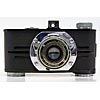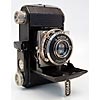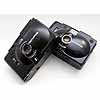Argus AF [1937]
|
|
Halina Pet [1962]
|
|
Kodak Retina I [1934]
|
|
Lomo Fisheye [2005]
|
|
Minox 35 ML [1986]
|
|
Olympus C-7070wz [2005]
|
|
Olympus XA & XA2 [1979]
|
|
Polaroid SX-70 Model 3 [1975]
|
|
Steky IIIA [1954]
|
|

 The
first affordable 35mm camera available in the US. American made and probably more
responsible for the popular adoption of the 35mm format than any Lieca ever made.
Affordable in 1936 the Argus A is down right cheap now; can still be found in
good condition online and in thrift stores, garage sales and rummage sales everywhere
for less than $20. No camera collection (users or shelf queens) is complete without
at least one A-series camera.
The
first affordable 35mm camera available in the US. American made and probably more
responsible for the popular adoption of the 35mm format than any Lieca ever made.
Affordable in 1936 the Argus A is down right cheap now; can still be found in
good condition online and in thrift stores, garage sales and rummage sales everywhere
for less than $20. No camera collection (users or shelf queens) is complete without
at least one A-series camera.  The Halina Pet was my first experience with a real camera. I
was 13 and saving up pocket money to be able to afford my first SLR but
I was about to leave the UK on a school trip - it would be my first
ever trip abroad and I wanted something better than the 110 instamatic
I had been using.My Mom went diving through a closet and
pulled out her old boxed Halina Pet from her college days.
The Halina Pet was my first experience with a real camera. I
was 13 and saving up pocket money to be able to afford my first SLR but
I was about to leave the UK on a school trip - it would be my first
ever trip abroad and I wanted something better than the 110 instamatic
I had been using.My Mom went diving through a closet and
pulled out her old boxed Halina Pet from her college days. I
want to say that there is a feeling of nostalgia about using this camera but as
it came into being 30+ years before I did that would not be an accurate statement.
You definitely get a feeling of what it must have been like to be a photography
enthusiast in days long gone. In that way it is something like using a ghost.
You can't help but wonder about the people who have used that camera before you;
the previous owner whose steady use of the manual film counter interlock controls
wore through the black enamel paint. What did he take pictures of with this relic?
What 'new' camera did he replace the Retina with? Did he have as much trouble
as I do squinting through that tiny viewfinder?
I
want to say that there is a feeling of nostalgia about using this camera but as
it came into being 30+ years before I did that would not be an accurate statement.
You definitely get a feeling of what it must have been like to be a photography
enthusiast in days long gone. In that way it is something like using a ghost.
You can't help but wonder about the people who have used that camera before you;
the previous owner whose steady use of the manual film counter interlock controls
wore through the black enamel paint. What did he take pictures of with this relic?
What 'new' camera did he replace the Retina with? Did he have as much trouble
as I do squinting through that tiny viewfinder? 
 Let's face it, these are the autumn days of film cameras ... cold, late autumn days. There's no point in a film camera trying to out-sophisticate its digital equivalent. Film diehards may still just win theoretically with arguments on resolution and latitude but these are their last footholds and these too may soon be swept away. So where can film still win? Film is no longer mainstream and it never will be again so it's use is being relegated to niche markets and fun concepts.
Let's face it, these are the autumn days of film cameras ... cold, late autumn days. There's no point in a film camera trying to out-sophisticate its digital equivalent. Film diehards may still just win theoretically with arguments on resolution and latitude but these are their last footholds and these too may soon be swept away. So where can film still win? Film is no longer mainstream and it never will be again so it's use is being relegated to niche markets and fun concepts.
 Its 35mm, f2.8 Minotar lens does have a fantastic reputation for sharpness and contrast. The camera also claims to be the smallest 35mm ever made; a claim that earns it a place in my little collection at least.
Its 35mm, f2.8 Minotar lens does have a fantastic reputation for sharpness and contrast. The camera also claims to be the smallest 35mm ever made; a claim that earns it a place in my little collection at least. A wide, solid, prosumer digicam from my favorite Manufacturer. The perfect carry camera for many enthusiasts and professionals when they don't want to carry the full banana SLR rig. Especially well suited to street, landscape and interior photography.
A wide, solid, prosumer digicam from my favorite Manufacturer. The perfect carry camera for many enthusiasts and professionals when they don't want to carry the full banana SLR rig. Especially well suited to street, landscape and interior photography. The Olympus XA and XA2 were revolutionary in their day with their plastic, cam-shell cases. The XA is a true rangefinder in a tiny package with an amazing f2.8 lens. The simpler XA2 is a zone focusing camera which can be had for much less money than a Lomo LCA while producing superior images.
Either make a great pocket camera.
The Olympus XA and XA2 were revolutionary in their day with their plastic, cam-shell cases. The XA is a true rangefinder in a tiny package with an amazing f2.8 lens. The simpler XA2 is a zone focusing camera which can be had for much less money than a Lomo LCA while producing superior images.
Either make a great pocket camera. The
model 3 was the only SX-70 that wasn't an SLR and it was also the least expensive
SX-70. It still has the same black and tan 70s' styling and lens, but with scale
focussing rather than a more accurate SLR split screen. I wish I'd known this
when I answered the ad on Craigslist which resulted in my buying this example
for $15.
The
model 3 was the only SX-70 that wasn't an SLR and it was also the least expensive
SX-70. It still has the same black and tan 70s' styling and lens, but with scale
focussing rather than a more accurate SLR split screen. I wish I'd known this
when I answered the ad on Craigslist which resulted in my buying this example
for $15. At
the time that I bought it I had intended to use the Steky but rolling 16mm film
into tiny, fiddly cartridges in the dark room was beyond me. Today, I don't really
see the attraction of sub-mini cameras as users although they do have a cult
following of enthusiastic users. I doubt, therefore, that I'll ever really use
this camera but I still love having it around. It's beauiltifully built, an engineering
jewel, and just amazing that they managed to fit so many features into such a
tiny package.
At
the time that I bought it I had intended to use the Steky but rolling 16mm film
into tiny, fiddly cartridges in the dark room was beyond me. Today, I don't really
see the attraction of sub-mini cameras as users although they do have a cult
following of enthusiastic users. I doubt, therefore, that I'll ever really use
this camera but I still love having it around. It's beauiltifully built, an engineering
jewel, and just amazing that they managed to fit so many features into such a
tiny package.